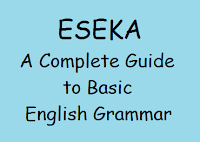Conjunction
 A Conjunction is a word which is used to join words or sentences together ;as,
A Conjunction is a word which is used to join words or sentences together ;as,1. Two and two make four.
2. Come and sit by me.
3. He tried hard, but failed.
4. Work or go away.
The words 'and' , 'but' , 'or' which are used to join one sentences to another are called Coordinating Conjunctions .
More Examples of Conjunctions
1. As he was not at home , I spoke to his father .
2. Since you say so, I must believe it.
3. You cannot succeed because you do not work .
4. Take a cup of milk before you go to bed .
5. When I saw the snake I ran away .
6. If you work , you will pass.
7. Wait here till I return.
8. Ask him whether he wishes to go out or not.
9. Don't answer unless you know.
10. They are poor yet(still) cheerful .
11. You are taller than I (am).
Learn: Such Conjunctions that join together two sentences of unequal rank or order are called Subordinating Conjunctions.
Conjunctions Used in Pairs
1. Either he or his friend has done it.
2. Neither she nor her sister stood first .
3. He is either a fool or a rogue.
4. We neither borrow nor lend money.
5. We both love and honor him.
6. Ramu is both intelligent and diligent.
7. Although he is rich yet he is not happy.
8. The poor man is not only blind but also deaf.
9. Vijay not only passed but also won a scholarship.
10. No sooner did the bell ring than the boys came out of their classes.
11. The old man is so weak that he cannot walk.
12. Hardly had we reached the railway station when the train left.
13. As you sow so shall you reap.
14. It matters little whether we win or lose .
15. I like such boys as are honest .
Combination Of Sentences
Combined sentences Exercise with Solution:
1. We bought a horse. We bought a cow.
1. We bought a horse and a cow.
2. Neelam can read English. Neelam can write English .
2. Neelam can read and write English.
3. Harish failed. Ramesh passed.
3. Harish failed but Ramesh passed.
4. I called on you .You were not at home .
4. I called on you but you were not at home.
5. Work hard . You will fail.
5. Work hard or (otherwise) you will fail.
6. Work hard. You will fail in the examination.
6. Unless you work hard , you will fail in the examination ..
7. You are very late. You must hurry.
7. You are very late , so you must hurry.
As you are very late , you must hurry.
You must hurry because you are very late.
8. He is very old .He enjoys good health .
8. He enjoys good health although he is very old.
9. His father is poor. People respect him.
9. His father is poor , still (yet) people respect him.
10. He has great wealth . He is unhappy.
10. Although he has great wealth , he is unhappy.
Though he has great wealth , he is unhappy.
Exercise 1 :
Join each pair of sentences by using 'and' , 'but' , 'or' .
1. Sunil has come . Subash has gone .
2. Do your work . I shall punish you.
3. She is a kind mother .She is a loving mother.
4. We ran fast . We missed the first bus .
5. She must weep . She will die.
6. God made the country .Man made the town.
Exercise 2 :
Join the pair of sentences by using 'or , else, otherwise, unless'.
1. He must work hard . His teacher will punish him.
2. You must be quiet . You must leave the room.
3. Tell the truth . You will be punished .
4. You must take exercise daily . You will not keep fit.
5. You must work . You will not stand first .
6. She must walk quickly . She will miss the train .
Exercise 3 :
Join the pair of sentences by using 'so, therefore, because, since'.
1. It is raining heavily . We cannot go to school .
2. Hari Singh failed in the examination. He did not work hard.
3. The little boy is crying . He has lost a two rupee note.
4. Leela is liked by all. She is sweet tempered .
5. Ashoka was a good king. All his people liked him .
6. Subash was not there. I spoke to his brother .
Exercise 4 :
Join the pair of sentences by using 'though, although , yet, still.'
1. She is an honest woman . She is very poor .
2. The rich man is not happy. He has a lot of wealth .
3. My father is poor. The neighbours respect him.
4. Rajni was weak in all the subjects . She passed the examination .
5. The boy did not succeed. He studied hard.
6. They are poor. They are contented.

